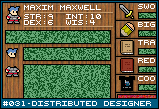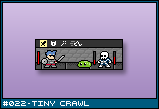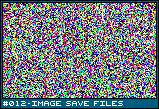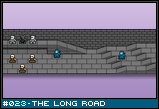| Three Hundred |
| - Index Page |
| - About... |
| - By Year |
| Collections |
| - Comp-Grid |
| - Procedural |
| - Tactics |
| - Tiny Crawl |
| - Misc |
| Previous | Mechanic #031 | Next |
![[banner1.png]](set02/img/entry031-banner1.png) This premise begins with a banner game - not necessarily [#022 - Tiny Crawl]. In this case, I've decided on a small, banner-based version of [#023 - The Long Road] (though it could be any small game). The idea is that different websites host their own instance of this game, with its own levels, enemies, and items to find. Then you are able to take a character between each instance through the use of [#012 - Image Save File]. You simply paste your image in, and when it's done, it'll put a new image in the clipboard for you. ![[card1.png]](set02/img/entry031-card1.png) Your character is saved on a sort of image card. This card is actually quite small (it's blown up 200% here) so there's probably plenty of room for expansion, both in data box content and human readable information. I'm going to describe each box individually, starting top to bottom, left to right:
![[card2.png]](set02/img/entry031-card2.png) Each website that wishes to run an instance will likewise use a card system. Each element in the game will be wrapped up in an easily portable card. For instance, this card is a Skeleton enemy, and in the databox is everything that is needed to have one, from stats to graphics to scripting. An entirely self contained game design element that can be imported and shared. Each website will download a designer program. Just drag all the cards you have collected into the program's folder and it will become available for the gui to insert into the level. Then, after careful design and implementation, the designer program will pop out a level file (Text XML that requires the images to be present or a binary which has compressed entity data included for minimal download connections and size). If you use any unsigned entities in the project, the resulting instance will likewise be unsigned. I'm thinking this could be represented by simply changing the border color of the instance. Designer could also design and publish entities, tilesets, levels, and whatever and upload them to a core repository. Only instance owners can access this stuff, not the players, such that the players still have to play through instances in order to find loot. A central depository will also allow for a database of objects, offloading responsibilities to the instance runner, and make signing high quality content possible. And that's the idea. A series of games that extend across the world wide web, a player who can bring content between them, and an easy means by which to share development content between instance runners.
I really see it as an extremely effective marketing scheme. Say you are developing a website for the next big videogame. You could create a dozen different instances with graphics and content based on your game, then hand them out to fan sites to each hold a part of the whole. It will encourage players to visit all these fan sites to try these games, but it will also really drive home the brand name and develop a sort of secondary hype for both the banner game and ultimately the primary product as well. Or you could use it to allow players to share content from a community. Say you give an instance out to a bunch of webcomics, each one tailors the content of their own instance to represent their own webcomic world. Then players could take content from one to another, like taking a Maxim character into an instance based on Gods of Arr-Kelaan, or to deliver a gnarled stick of whoop ass +4 to a game based on the world of Penny Arcade (or heaven forbid, deliver a fruit fucker anywhere).
|



